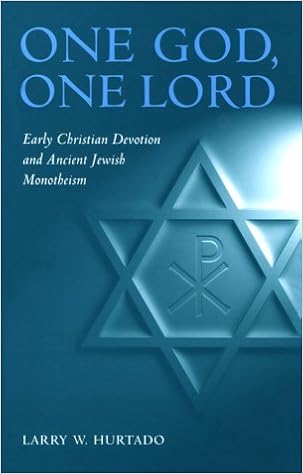Hurtado rejects the idea that such acceptance stemmed from the Gentile side of the church and that Jewish Christians did not see Jesus as divine. Rather, he says that the idea of divinity was routed in certain concepts having to do with a kind of second in charge or command, behind God--a divine agent who works for and on behalf of and in place of God.
This agent can be found in various forms: as a personified attribute, such as wisdom or the word; as an angel; or as an important human figure/prophet. Of particular note, however, is the angel, for a principal angel figures prominently in many Old Testament and inter-Testamental passages. In this sense, then, Hurtado says, we can see the risen Jesus as fitting into the Jewish concept of a chief angel, a divine agent.
However, that would not mean that Jesus was one who early Christians worshipped, and Hurtado notes that unlike the divine agent's treatment in most earlier texts, it's clear that the worship practice of early Christians included Jesus with God. How that came about is not quite clear, but, Hurtado implies, it was likely related to Jesus's resurrection--an event that changed the view of certain peoples.
Hurtado's ideas are intriguing, especially as one tries to figure out how a Jewish person would have felt about Jesus at the time. The divine agent certainly seems like one avenue by which people could have seen him. But if the Gospel accounts are accurate, it's clear that Jesus claimed divinity of himself while alive, which still is rather mind-boggling insofar as having people accept that. Miracles must have played a large role, with the resurrection being the final step to such acceptance.







No comments:
Post a Comment